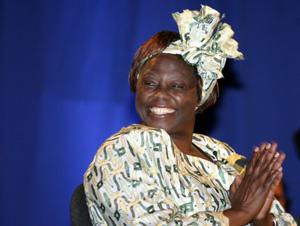The challenge for Africa
Dr. Wangari Maathai
When Wangari Maathai suggested to women in her village that they should plant trees for fire wood and to stop soil erosion, she had no idea that this simple act of planting trees would eventually garner her the Nobel Peace Prize.
In addition to being a a Nobel Peace Prize winning activist, Dr. Maathai is also founder of the Greenbelt Movement, and author of the new book, "The Challenge for Africa." Her life is subject of the documentary "Taking Root: The Vision of Wangari Maatha," which premiered on the PBS series "Independent Lens" this week.
On "The Takeaway," Femi Oke talks to Dr. Wangari about her vision for the future of Africa.
Recording of Dr. Maathai: "We want honesty! We want justice! If we are going to shed blood because of our land, we will! We are used to that. Our forefathers shed blood for land! We will do so. This is my blood."
Femi Oke: Good morning, Dr. Troublemaker. Take us back to that scene. When was it? Where was it? What was happening?
Wangari Maathai: [Laughs] That scene was at Karuru Forest. For those who know Nairobi, it’s a forest that kind of encircles Nairobi, or forms a semicircle around Nairobi. It’s a very old forest. It’s a forest that always separated the savannahs from the highlands. And it is a very, very important part of Nairobi, it freshens the air of Nairobi. It’s a very important part of a clean and healthy environment for Nairobians.
Oke: Anybody who is African or who knows anything about Africa will know you because you’re the first Nobel laureate from the African continent. The first female Nobel laureate. So you’re extremely famous. But there are people out there who don’t know your work, and a good introduction is a film coming out on PBS and that’s on April 14. It’s called < Taking Root: The Vision of Wangari Maathai. It premiers next week. How long did it actually take you to film that documentary?
Dr. Maathai: I want to pay tribute to Alan and Lisa, a couple from Vermont who actually tried very, very hard to capture the story for almost five years. They started before the price and had to start all over again over the price. They really paid a lot of attention to the story and tried to understand the story behind the story. I think they’ve done justice and will help people to understand the many challenges that people face in Africa.
Oke: I just want to emphasize that you are a huge celebrity and you get followed around all over the world and people come up to you and hug you. Ibrahim [Abdul-Matin, The Takeaway sports blogger] was just shaking your hand, he was honored to meet you. How does it feel, then, to take all of that adoration on and then see it in a documentary? How comfortable were you with what they put together?
Dr. Maathai: Well I’m quite comfortable to talk about my experiences and narrate this story, but sometimes it is uncomfortable looking at a film and looking at myself. That I’m not used to.
Oke: You also have a book out, so you’re seriously doing some branding for yourself here. The book is called The Challenge for Africa. A lot of people talking about Africa, how do we fix Africa, what is different about your angle that you’re taking?
Dr. Maathai: I have a special angle because, first of all, I’m an African. I have been in Africa working at a grassroots level, working with the people and trying to face these challenges, and the book is a reflection of how I have tried to understand these challenges and deal with them, and to a certain extent offer suggestion on what I think we should be doing in order to help Africa get out of the stereotype that we now have around the world of poverty, underdevelopment and such.
"The Takeaway" is a national morning news program, delivering the news and analysis you need to catch up, start your day, and prepare for what’s ahead. The show is a co-production of WNYC and PRI, in editorial collaboration with the BBC, The New York Times Radio, and WGBH.
The article you just read is free because dedicated readers and listeners like you chose to support our nonprofit newsroom. Our team works tirelessly to ensure you hear the latest in international, human-centered reporting every weekday. But our work would not be possible without you. We need your help.
Make a gift today to help us reach our $25,000 goal and keep The World going strong. Every gift will get us one step closer.
